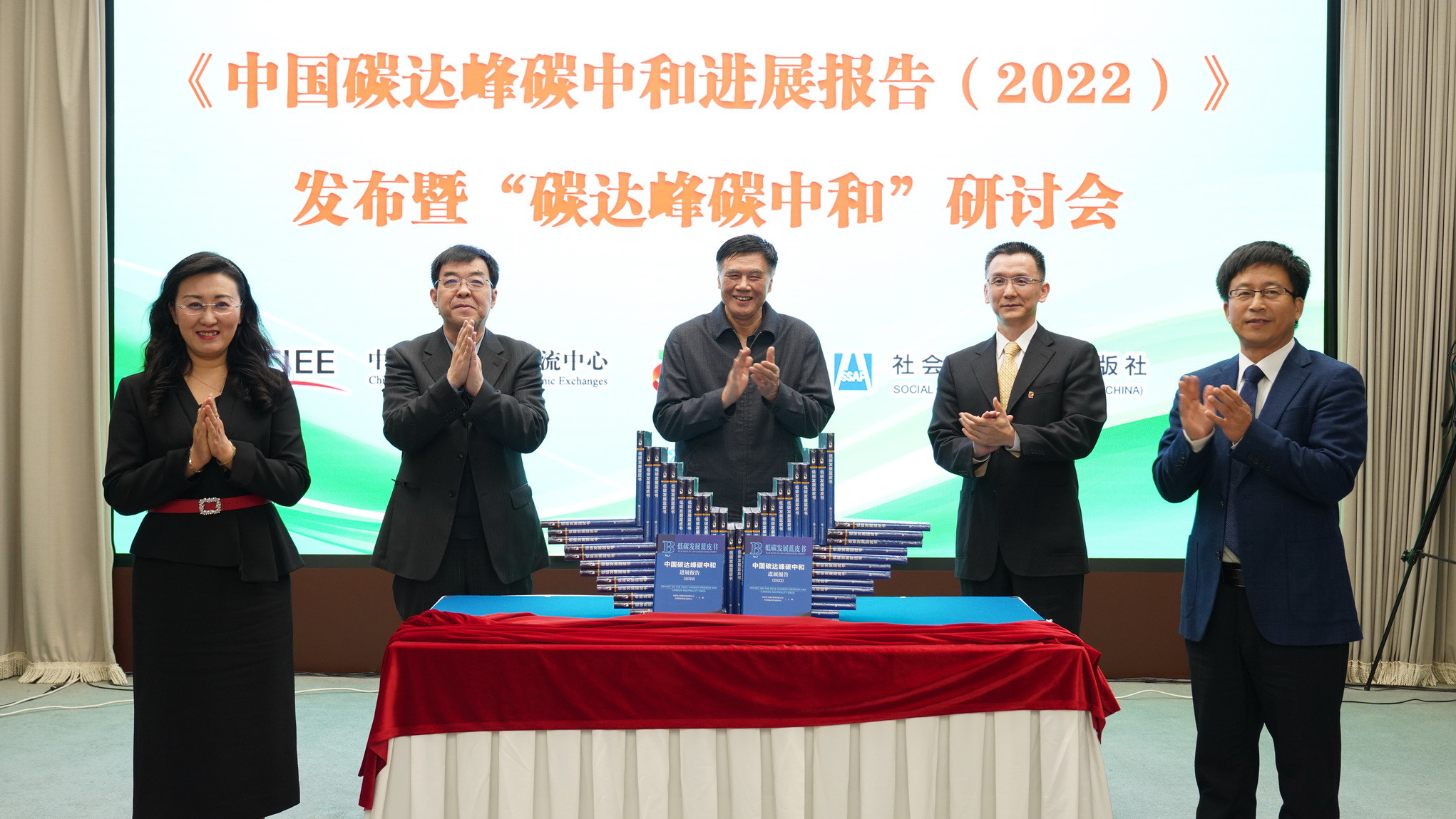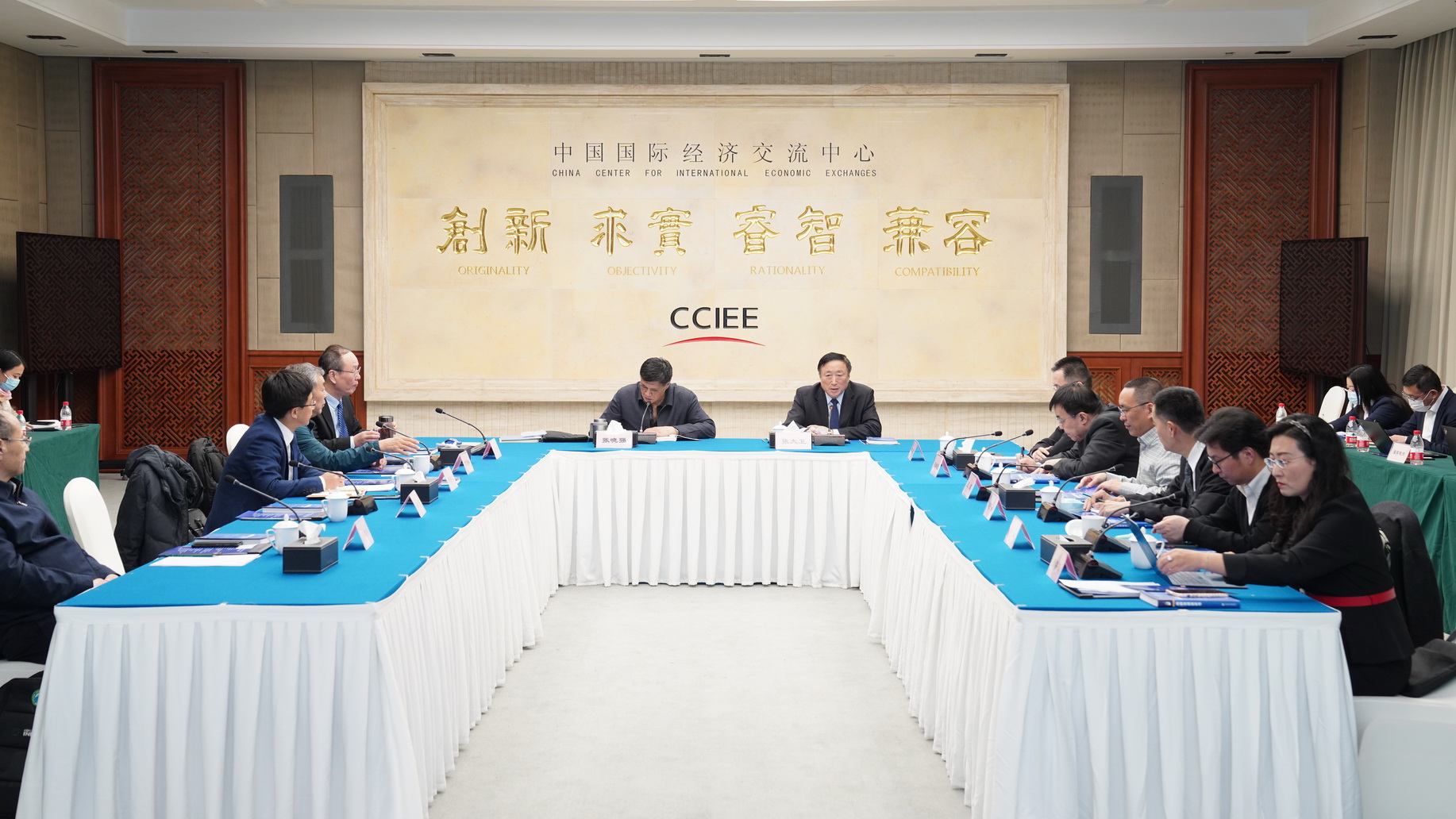The Report on the Peak Carbon Emission and Carbon Neutrality (2022) was Released and the “Carbon Peak and Carbon Neutrality” Seminar was Held in Beijing
- Time:2023-02-28
- source:CCIEE
On February 28, 2023, the China Center for International Economic Exchanges (CCIEE) held the book launch of "Report on the Peak Carbon Emission and Carbon Neutrality (2022)”(The Report) and “Carbon Peak and Carbon Neutrality” Seminar. The meeting was chaired by Zhang Dawei, Vice Chairman and Secretary-General of CCIEE. Zhang Xiaoqiang, Executive Vice Chairman and CEO of CCIEE, former Vice Chairman of the National Development and Reform Commission; Nong Gang, Assistant to the General Manager of State Power Investment Corporation Limited (SPIC); and Wang Limin, President of Social Sciences Academic Press(China), delivered speeches at the meeting.

Wang Yiming, Vice Chairman of CCIEEE and Chairman of the Academic Committee at CCIEE; Li Junfeng, the inaugural Director of the National Center for Climate Change Strategy and International Cooperation and Director of its Academic Committee; as well as leaders and experts from Peking University, North China Electric Power University, China National Petroleum Corporation, China National Coal Group Corp, State Power Investment Corporation, and other institutions attended the meeting and delivered speeches. Jing Chunmei, Director of the Department of Research Management and Information Services( Institute o f Energy Policy Studies) of CCIEE and leader of the research group, gave a special report on the "Latest Progress, Challenges, and Suggestions for China's Carbon Peak and Carbon Neutrality."

The Report continues to focus on the theme of "dual carbon" and invites authoritative institutions, universities, central enterprises, and well-known experts from the Energy Research Institute of National Development and Reform Commission, Peking University, Tsinghua University, and others. With a global perspective and strategic approach, the report provides suggestions on advancing the "dual carbon" goals, accelerating energy structure adjustments, promoting green and low-carbon transformation in industries, improving the policy framework for "dual carbon," and enhancing international cooperation in the "dual carbon" field. These recommendations aim to provide references for industry professionals and researchers to understand the latest developments of "dual carbon" initiative.
The Report indicates that the domestic and international situation in 2022 has become more complex and volatile, with factors such as the Ukraine crisis, geopolitics, extreme weather, and fluctuations in the energy market having a profound impact on global efforts to address climate change. Countries are prioritizing energy security, and several European countries have restarted coal-fired power plants to alleviate the energy crisis, leading to a resurgence in fossil fuel consumption. But on the whole, the direction of global green and low-carbon transformation will not change. From a domestic perspective, China is facing increasing pressure to balance economic development, energy security, and low-carbon transformation. However, the "dual carbon" strategy is still being steadily promoted. The 20th National Congress of the Communist Party of China proposed that China should build upon its energy and resource endowments and adhere to a strategy of "establishing targets before taking actions," implementing the carbon initiative in a planned and step-by-step manner, actively and steadily promoting the goal of carbon peak and carbon neutrality. Over the past year, China has further improved the "1+N" policy system for achieving the goal of carbon peak and carbon neutrality. Various departments have successively issued over 40 policy documents in areas such as energy transformation, energy conservation, carbon reduction, efficiency enhancement, industry, urban and rural construction, and transportation. Different regions and industries have refined their action plans for carbon peak based on their specific circumstances, and the implementation measures have been further enhanced, leading to positive progress in the "dual carbon" strategy.
The Report suggests that in the future, China's supportive policy system for the "dual carbon" strategy will be further improved. The pathways to carbon peak will be differentiated and detailed in different regions and industries, and the progress of the work will be more pragmatic. The next step is to grasp the overall requirements of establishing targets before taking actions and promote in an orderly manner. This includes accelerating the planning and construction of a new energy system, vigorously promoting clean and efficient utilization of coal resources, focusing on optimizing the combination of coal and new energy to achieve large-scale development of renewable energy. It is necessary to accelerate the transformation of the industrial structure, promote the orderly development of high-capacity emerging industries and green and low-carbon industries, comprehensively strengthen energy resource conservation and recycling, and enhance demand-side management. It is important to establish a sound "dual carbon" system and policy framework, differentiate international cooperation, and create a favorable internal and external environment for achieving the "dual carbon" goals.
The attending leaders and experts unanimously expressed that The Report provides an in-depth interpretation of the strategic deployment and progress of the "dual carbon" strategy by the CPC Central Committee and the State Council. It puts forward recommendations for actively and steadily promoting the "dual carbon" initiative while ensuring the bottom line of energy security and economic development under the requirements of high-quality development and the construction of a modernized nation. The Report provides detailed, objective, and rigorous data, and it holds significant reference value for relevant departments, localities, and enterprises in advancing the "dual carbon" initiative.
